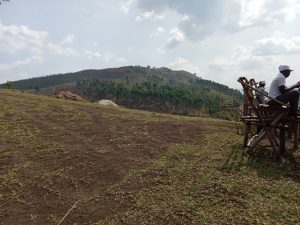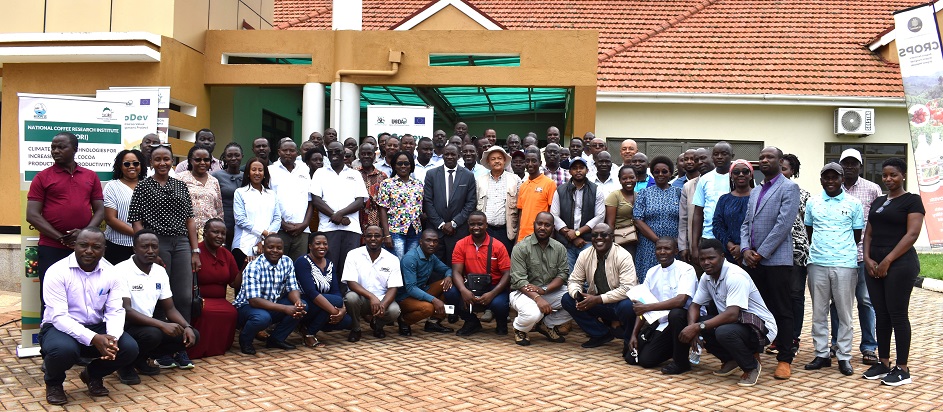Kaganda (in red T-Shirt) taking the UCDA team through the process of coffee drying
Farming business is not for the faint-hearted; you must be passionate and determined to overcome setbacks if you are to succeed.
This is a major lesson from Godfrey Kaganda and his wife Shakira Buhura, the proprietors of Mugamba Farm that focuses on organic Arabica coffee growing in Kabarole district. The farm is integrated with bananas/matooke. They are also into cocoa farming and beekeeping.
The 320-acre farm is located in Harugongo village, Mugamba Sub-County, Kabarole district, at the boundary of Semliki Wildlife Reserve in the Western Rift Valley, offering visitors stunning views of the savanna plains in the wildlife reserve.
Semliki Wildlife Reserve is popularly known for birds and boasts 440 bird species.
The coffee journey starts
It has not been a smooth journey for the Kagandas. It was in 2013 when they bought the 320 acres of land to set up a modern farm.
Kaganda says they started by planting eucalyptus.
“We planted 150,000 trees of eucalyptus,” Kaganda revealed as his wife looked on.
He was narrating his story to the Uganda Coffee Development Authority (UCDA) Board Members and top management that visited Mugamba Farm on Friday March 11, 2022.
The UCDA team was in the Rwenzori region to appraise and evaluate the performance of the Authority’s field activities.
Besides eucalyptus, Kaganda says he planted matooke, but got an idea along the way to have something that could last for generations.
“We thought about coffee but we didn’t have enough knowledge about it. Whatever coffee (type) we saw, we thought it would work here.
In 2007, we went to visit our friend in Wakiso; he had very good coffee and we thought it would work here. We bought 5,000 Clonal plantlets (Robusta) from him and planted them here,” Kaganda revealed.
“Eight months down the road, nothing was coming up and it was too dry. We ferried in water and used waste plastic bottles to irrigate the coffee, but it wasn’t growing well. On the other hand, matooke was doing very well. That’s when we realized that we had planted the wrong type of coffee,” he added.
Kaganda started making research on why the coffee was not performing as expected and that is how he got to know about UCDA.
“A friend referred me to UCDA. I looked for them (UCDA technical people) and brought them here. When they measured the altitude, they told me that this altitude (1,700 feet above sea level) is for Arabica not Robusta,” he said.
Having learnt the hard way, Kaganda didn’t give up. He composed himself and started afresh.
“We had to start afresh. That’s how our journey started; we knocked ourselves, fell on the ground and stood up, dusted ourselves and moved on. We said there’s no time to waste; we had already wasted 8 months, so we set to roll out in a big way with support from UCDA,” Kaganda revealed.
He said they started cutting off eucalyptus trees in 2017 and replacing it with coffee. They continue to cut the eucalyptus up-to-date.
“We have so far planted 130 acres of Arabica coffee but many of the trees are yet to be productive,” Kaganda told Business Focus.
“We have been planting coffee since 2017 and this season we are going to plant more coffee,” he said.

Value Addition
He added that they got their first harvest in 2019.
“We harvested about 3 tonnes; someone took our red cherries but the pay was poor. We sat down and decided never to sell red cherries again. We started on the journey to add value in our small ways,” Kaganda said, adding that: “We realized there was a huller within the area and started adding value to our coffee.”
Kaganda took us to his home to demonstrate the meticulous process they take their coffee through to ensure high quality.
“We control the entire value chain from farm to cup,” Kaganda said as he showed us a branded pack of Mugamba Coffee.
“We are now selling ground and roasted coffee under Mugamba Organic coffee brand,” he added.

Agritourism farm
Kaganda says Mugamba farm is an agritourism centre as people from different walks of life come to enjoy various coffee experiences, watch birds and have a view of the wildlife reserve.
“We intend to plant about 50 acres of indigenous trees so as to attract more bids. We commissioned the birders to do research here; they spent sometime here and discovered that as the farm is now, we have over 50 species of birds on the farm,” Kaganda said in an exclusive interview with Business Focus.
“We want to make this farm a tourism centre, with coffee being the main crop on the farm,” he said, adding that they have also planted ficus trees to provide shades to the coffee and attract more birds.
He further revealed that the farm currently has 370 beehives.
“We process honey and sell it as Mugamba Organic honey. We harvest honey when rains are about to start. It is harvested twice in a year,” he said.

Shakira Buhura, a Director at Mugamba Farm, said the couple works together to grow the farm.
Speaking about agritourism, Buhura said: “We already have many visitors coming through from all over the world. We have coffee experiences. We also get farmers who want to learn about matooke, coffee, beekeeping. Being at the rim of Semliki Wildlife Reserve, we have birders coming to watch the birds. We have waterfalls, and a beautiful view of the Game Reserve,” Buhura said, adding: “…We have an average of 30-50 people visiting the farm per month.”

Supporting Local Community
Kaganda said they are not big “but whatever you do when you are small, you’ll always do when you’re big.”
“So whatever we are getting in a small way, we try to share with the community. There are so many people around but they don’t have land. We give them seedlings, beans and Irish potatoes to plant in our coffee as it grows. We plant coffee and they plant their own crops and weed our coffee,” he said.
He added: “After giving them seeds, for every 100kgs of beans, they give us 20kgs. If I give you 10kgs and you get 100kgs, you give the farm 20kgs. That’s what we use to feed our workers. We have a workforce of 50 workers who are permanent here. It’s a small number though compared to the work available.”
Kaganda said that in an acre of Irish potatoes, a farmer is able to get about 10 tonnes.
“It’s mainly used for chips. Someone buys Irish potatoes from them and sells to Cafe Javas,” he said, adding: “We shall move with them, we teach them about coffee and best agronomic practices.”
Kaganda revealed that they want to go into wet processing so that almost everything is done on the farm.
“More of them will be employed in the whole value chain once we get the wet processing factory here,” Kaganda said, adding: “We have about 100 families working here. You can see they have prepared their gardens waiting for rains to plant.”

He said although matooke is giving them some quick money, the farm is yet to break even.
Challenges
Like other farmers, Mugamba farm isn’t immune to challenges.
Drought is one of the biggest challenges affecting Mugamba Farm.
“We wait for the rains to plant. We have water around but moving it from down in the valley is very difficult,” he said, adding: “We would like everything to happen on the farm. We want drying to happen here so that the whole village benefits.”
Pests and diseases is yet another challenge for Kaganda.
He noted that he lost about 450 coffee trees last season to mealybugs, but it has since been managed with the guidance of UCDA.
He however said pesticides and fungicides are quite expensive.
He also revealed that EFRIS (Electronic Fiscal Receipting and Invoicing System) is also affecting their sales since most supermarkets are rejecting their coffee.
“We processed our coffee but some supermarkets are now rejecting it because of EFRIS. When you add value, they tax you hard even when you are yet to break even. Our coffee was moving well but now things are tough. Now we shall be selling green beans,” Kaganda told the UCDA team, with sadness written all over his face.
UCDA Pledges Support
Doreen Rweihangwe, the Ag. Director Quality and Regulatory Services at UCDA promised to ensure that Mugamba coffee gets its coffee profiled by the Authority for better marketing.
“Mugamba staff will also be trained at the farm into coffee processing,” Rweihangwe said.
Dr. Sadik Kasiim (NARO representative on the UCDA Board), who spoke on behalf of UCDA, thanked Mugamba farm proprietors for supporting the local community.
He pledged to advocate for the farm, saying UCDA’s board is carefully selected from different sectors.
He said the farm will in future be a big tourism site that will bring money to Uganda.
“In future, this place will earn Uganda a lot of money. It will not benefit only you,” he said.
He said the Government can support him to raise water up by gravity and the whole village can benefit.
“Our strategy is to network this farm. An eco-friendly farm requires it to be green all the time and this requires water. These are things we need to advocate for this farm. If the Minister of Agriculture is in this region visiting farmers, he should be encouraged to come and visit this farm,” he said.
He also thanked UCDA staff for being practical by helping farmers.
Martha Nalubega Wandera (a representative of coffee roasters on the UCDA Board), said one thing that stood out for her at Mugamba farm is the way the husband and wife supplement each other in running the farm. “That’s impressive and that’s what we would like to see as UCDA Board. We want to see that women are seen as partners in the coffee business. We want them to benefit and contribute just like the men,” Nalubega said.
She added: “I also like the involvement of the community around into the farm’s operations so that they improve their lives.”
Nalubega noted that UCDA needs to pay attention to the challenges affecting farmers such as pests and diseases, high taxes and expensive fertilizers.
“We need to find solutions to these challenges,” she said.






